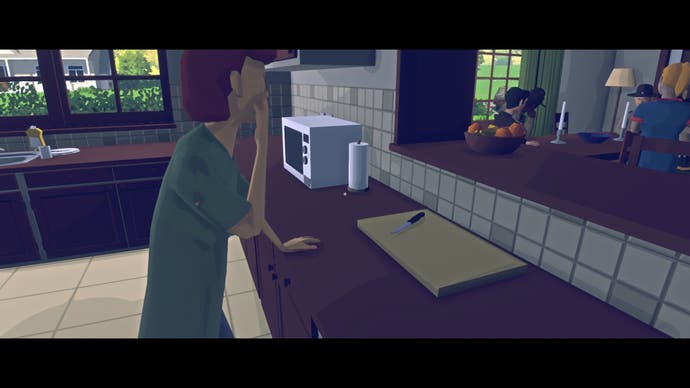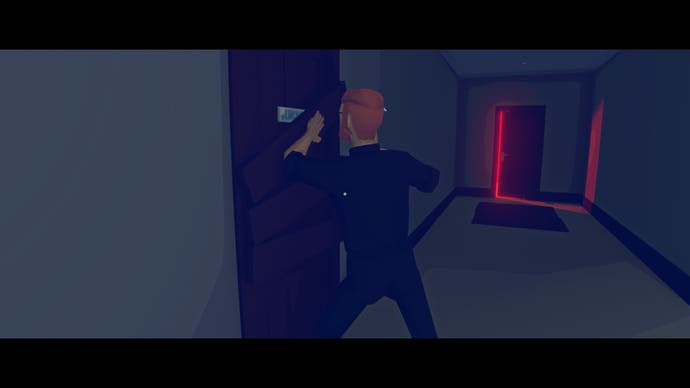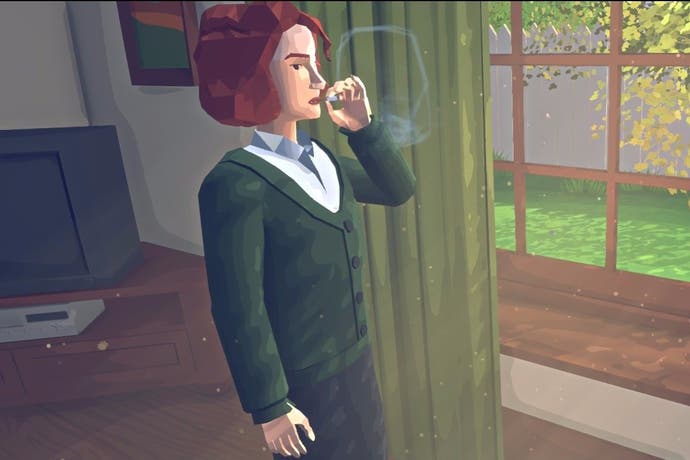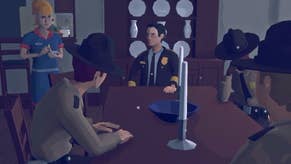Virginia, one of 2016's most promising games, is coming to Xbox One, PS4 and PC next month
How Variable State's narrative adventure redefines what cinematic means for video games.
Back in 2014, when wordless narrative adventure Virginia first broke ground at EGX, Paul Dean enthused on our behalf that it was the best new game he'd played that year. Now it's 2016 and we're mere weeks away from release - publisher 505 Games has picked up Variable State's game for release on PC, PlayStation 4 and Xbox One on September 22nd - I think I can say this is the best new game I've played this year, too. Virginia is absolutely sublime.
Following in the footsteps of other like-minded games such as Gone Home, Firewatch and Thirty Flights of Loving, there's a real swagger to how Virginia goes about its business, and a real confidence in how Variable State tells its story. Nominally this is a detective thriller set in the early 90s, casting you as FBI agent Anne Tarver as she works her way through a languid mid-Atlantic town stirred by the disappearance of schoolboy Lucas Fairfax.
True Detective, Silence of the Lambs and a little slice of ethereal Lynch magic are being touted as Virginia's touchstones, but what's got me excited about it is another connection that's unlikely to find its way into any marketing material. In its downbeat drawing of smalltown America, in moments like the unwelcome knock at the door of a grieving parent's house or the loaded silence of a late-night car journey beyond the suburbs, there's something of short story writer Raymond Carver. There's that same deft efficiency to its storytelling, in its willingness to let key beats happen through a stolen glance rather than a monologue.

One scene in the short demo that's been assembled has stuck with me, somewhat remarkably given how low-key and quietly unremarkable it is. You've pulled up to a gas station somewhere out amongst the pines, the thinness of the dark suggesting it's coming up to midnight sometime in summer's late days, and with your FBI partner having gone to settle up the bill you're left alone in the car. Reach under the rear view mirror and there's a takeaway flyer advertising a Dukakis pizza - this is a period game, but it wears its early 90s stylings lightly - while rummaging through the glove compartment lets you sift through the detritus of your partner's car, and where you notice how her surname changes in the junk mail that's gathered. Virginia's the kind of game that's able to fill in important character details in the flotsam that surrounds them.
Virginia's a smart game made by smart people, in other words. Variable State's Jonathan Burroughs had worked previously at AI company DeepMind before its acquisition by Google, that particular move setting him on a slightly more cinematic but equally cerebral venture with Virginia. He's an incredibly softly spoken man - his voice is often lost in the fitting but noisy backdrop of the BFI Southbank's cafe where we meet along with Virginia's composer Lyndon Holland - but it's worth leaning in and listening to what he's got to say.
"Our ambitions were tiny initially," Burroughs says of the game that appeared at EGX in 2014. "It was going to be very lean - but I think it's become much bigger than we imagined, particularly in terms of the storytelling. We've been given the opportunity to spend more time with it. We could have told the story in half the time, but it would have been shabby."
The two years since have been spent expanding upon that premise, folding in new scenes and new characters. "It was an indulgence, really," says Burroughs. "There was almost three months of continuous writing starting at 9 in the morning, and coming up with ideas and going away to write scenes. I've never had an experience working in a writer's room, but it's kind of like that - we'd write scenes and come back and go through them together."
Virginia is a cinematic game, but it earns that descriptor more than many other games. You get the sense that Variable State has a deeper appreciation of what that term means than others, and the presence of Holland, who comes from a film background, certainly helps. "I think from working on films, working with directors and collaborating with people where it's always about story and characters - that's not always the case in games, and it shouldn't always be - I'm sensitive to making sure the nuances of the story come through," he says. "What's great about Virginia it doesn't have any real mechanics, there's no compromises about the story being about this one thing."
A game with no mechanics? That's an admission that's likely to court controversy (as is its insistence on PC that despite the option to play at 60fps Variable State insists you stick to 30fps, a small touch that made me burst out a little round of applause). "Someone who wants to be very cruel about the game could say it's about walking around clicking things, that's all there is to it," says Burroughs. "But if you're willing to get past that, you're seeing your character perform, your character is a body in the world with their own presence, and if you're willing to suspend disbelief and immerse yourself in this world you're experiencing the story through someone's eyes, through a character who is living a life that's distinct from anything you can relate to in your own life, and that's a meaningful and interesting experience, and it's just as valid as mastering a mechanic."

Those performances are carried out through some wonderful animation from Terry Kenny that sells Virginia's mute cast. The decision to not give any of them a voice is, it turns out, a powerful one. "There's no exposition through dialogue - all of it has to be done through visuals," says Burroughs. "I think having no dialogue, having no sounds humans make, there's this stark nature to it. In this world that no-one speaks - it kind of works in this story that's a thriller. It's always like you're arriving when a conversation's just finished. It gives so much more room to the soundtrack, and adds to the emotional impact of the scene."
Holland's score does much of the heavy lifting, a delicate dynamic number that wears its cinematic influences as heavily as any other part of Virginia's make-up (it was recorded in the same studio that Angelo Badalamenti captured Lost Highway's soundtrack). "Within the scene you'll interact with something, and the music will respond," explains Holland. "The music reacts in real-time, and it's constantly underscoring what you're doing in real-time. A lot of the time it's scoring the present time." Given Virginia's heavy use of jump cuts - something it borrows gratefully from Thirty Flights of Loving, and to great effect - it's the music that helps bind scenes together.
After what feels like so long after first learning about Virginia, what a delight that it's reemerged so close to the finishing line, with Variable State just tinkering with the project in its last few weeks. "It's unlike any game I've worked on previously," says Burroughs. "These final stages of the game, it feels like film editing. The end of a project can be quite dry - it's normally bug fixing or balancing - the game is kind of inert. We're doing proper edits - the order of scenes is being adjusted, the relative importance of scenes, even making changes to the animation and music, almost like the way you'd change shots."
There's not long to go now until Virginia sees the light, and I can't wait to get lost in it many mysteries. Variable State could be onto something special here, a smart narrative adventure that in its own way redefines what the term cinematic means for video games.










.png?width=291&height=164&fit=crop&quality=80&format=jpg&auto=webp)



